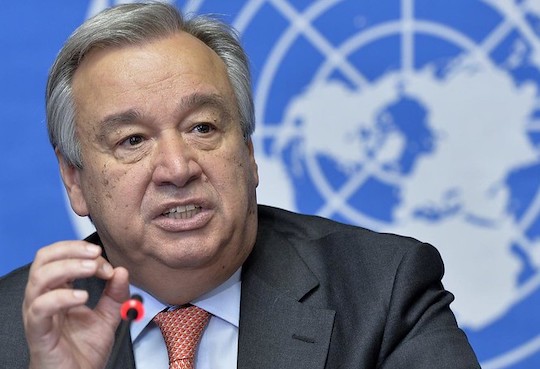
Wealthy nations must share more resources or risk crisis for billions, warns UN chief
The head of the UN has called on rich countries to step up efforts to protect workers hit by the Covid-19 pandemic with an additional $1tn (£736bn) injection of funds to avoid a twin-track recovery that widens the gap with the world’s poorest nations.
Speaking in New York, the secretary general of the United Nations, António Guterres, said the most serious global public health and economic crisis the world has faced in the past century was on course to worsen existing inequalities and threaten “the long-term livelihoods and well-being of hundreds of millions, if not billions, of people” without a greater determination by rich nations to share resources.
He said the gap between rich and poor nations is evident in the different access to vaccines and the ability of rich nations to borrow cheaply to fund welfare programmes while poorer nations are left to finance debts at high rates of interest.
A debt crisis across Africa, south and central America and parts of Asia was possible if poor countries continued to pay a high price for trying to protect their citizens from the worst effects of Covid-19, he said.
UN officials have become increasingly concerned that a growing divide between the world’s rich and poor nations is likely to worsen over the next few years as wealthy governments race to regain previous levels of economic activity.
There are fears that a growing digital divide and the impacts of wars and famines will combine with a looming debt crisis, the costs of the climate crisis and a lack of vaccine doses to setback progress across the developing world.
Gordon Brown, the former British prime minister and a UN special envoy for global education, said earlier this month that “denying the world vaccines is self-defeating and will come back to haunt us”.
Brown said: “The financial cost is small in comparison with the benefits in resumed employment, commerce and trade.”
Guterres called for a “global accelerator for jobs and social protection” that would create at least 400m jobs and “extend social protection to 4 billion women, men and children currently without coverage”.
In a report to accompany Guterres’s comments, the UN said: “This two-track recovery is now creating a great divergence, which, if not corrected, will undermine trust and solidarity and fuel conflict and forced migration, and make the world more vulnerable to future crises, including climate change.
The report said at least $982bn in government cash was needed to respond to the immediate labour market shocks of the crisis and “to support a just transition”.
In addition, rich nations should commit to spending of $1.2tn each year for social protection floors in low and middle-income countries.
“No advanced economy has achieved economic and social progress without investing in social protection systems and quality public services that provide people with the necessary support to navigate the vicissitudes of their lives,” the report said.
“While the wealth of billionaires increased by over $3.9tn between March and December 2020, the impact of the pandemic on the world of work, among other factors, increased the number of extremely poor by between 119 and 224 million people – the first increase in poverty in over 21 years.”
Original source: The Guardian
Image credit: Some rights reserved by UN Geneva, flickr creative commonsO
